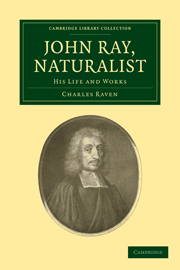Book contents
- Frontmatter
- Contents
- Preface
- Introduction
- ABBREVIATIONS
- Chapter I Boyhood and Youth
- Chapter II At Cambridge University
- Chapter III First Studies in Science
- Chapter IV The Cambridge Catalogue
- Chapter V The Years of Travel
- Chapter VI The English Catalogue
- Chapter VII The Years of Varied Output
- Chapter VIII The Structure and Classification of Plants
- Chapter IX The History of Plants
- Chapter X The Flora of Britain
- Chapter XI Last Work in Botany
- Chapter XII The Ornithology
- Chapter XIII The History of Fishes
- Chapter XIV Of Mammals and Reptiles
- Chapter XV The History of Insects
- Chapter XVI Of Fossils and Geology
- Chapter XVII The Wisdom of God
- Conclusion
- Index
Chapter III - First Studies in Science
Published online by Cambridge University Press: 07 September 2010
- Frontmatter
- Contents
- Preface
- Introduction
- ABBREVIATIONS
- Chapter I Boyhood and Youth
- Chapter II At Cambridge University
- Chapter III First Studies in Science
- Chapter IV The Cambridge Catalogue
- Chapter V The Years of Travel
- Chapter VI The English Catalogue
- Chapter VII The Years of Varied Output
- Chapter VIII The Structure and Classification of Plants
- Chapter IX The History of Plants
- Chapter X The Flora of Britain
- Chapter XI Last Work in Botany
- Chapter XII The Ornithology
- Chapter XIII The History of Fishes
- Chapter XIV Of Mammals and Reptiles
- Chapter XV The History of Insects
- Chapter XVI Of Fossils and Geology
- Chapter XVII The Wisdom of God
- Conclusion
- Index
Summary
I am very glad of the florid pursuits of that useful scholar Mr Wray.
Samuel Hartlib to John Worthington, Worthington's Diary, i, p. 342.The twelve years which Ray spent at Trinity after securing his fellowship were a period of profound importance for the intellectual life of Britain. Macaulay, summarising the condition of England in 1685, declared that ‘the English genius was effecting in science a revolution which will to the end of time be reckoned among the highest achievements of the human intellect…the civil troubles had stimulated the faculties of the educated classes and had called forth a restless activity and an insatiable curiosity…the torrent which had been dammed up in one channel rushed violently into another’. The suggestion that England was a pioneer in this field is not of course correct: in Italy, France, Germany and the Low Countries scientific studies had been attracting attention for at least a century. But Green's record—‘From the vexed problems, religious and political, with which it had so long wrestled in vain, England turned at last to the physical world around it…and its method of research by observation, comparison and experiment, transformed the older methods of enquiry in matters without its pale’—emphasises more judiciously the same characteristic of the period.
- Type
- Chapter
- Information
- John Ray, NaturalistHis Life and Works, pp. 43 - 71Publisher: Cambridge University PressPrint publication year: 2009First published in: 1942

